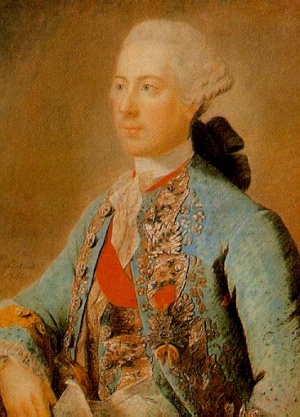Joseph II, Holy Roman Emperor (1741-1790)

Joseph II: Emperor of the Holy Roman Empire from 1765 to 1790; born 13 March 1741, the eldest son of Empress Maria Theresa (1717-1780) and Emperor Francis I (1708-1765). He became emperor of the Holy Roman Empire upon the death of his father in 1765, and King of Hungary, Bohemia, Croatia and Slavonia upon the death of his mother in 1780. After his death on 20 February 1790, he was succeeded by his brother Leopold II (1747-1792).
Joseph II was a uniquely progressive Hapsburg ruler. His emphatic reform ideas harmonized with the Enlightenment philosophers, whose (esp. Voltaire's) dedicated student he was (see Emancipation). Friedrich II of Prussia and Czarina Catherine of Russia had provided patterns for Joseph's policies designed to induce settlers to come to his lands. Joseph's imperial objectives included attempts to redress long and complicated grievances in law and law court procedures. These efforts, incidentally, brought up the local privileges as regards the Mennonite position on the oath. Refreshingly sound views were aired. (See the discussion by Crous.)
The death of Maria Theresa in 1780 made Joseph the uncontested ruler. Eager to apply reason and enlightenment to the power of state he issued on 13 October 1781, a Toleranz-Patent (Patent of Tolerance) granting freedom to the Greek Orthodox and Protestant confessions. Parallel to Catherine's 1763 Manifesto inviting German farmers to Russia, he issued on 17 September 1781, the "Kolonisten-Patent" opening his eastern provinces to immigrants. This law attracted a number of Palatinate Mennonite families into Galicia. The decree of acceptance (Annahmedekret) for the Palatine group was handed down on 29 March 1784. Alsatian Amish followed from Montbeliard. The 1781 events mark a memorable chapter of Joseph's reforms. They reveal him as a just benefactor to Mennonites and other Protestants. His toleration patent brought relief to them and provided an escape avenue far less troublesome than the passage to the New World.
Bibliography
Blaas, R. "Die K. K. Agentie für Geistl. Angelegenheiten, 1730-1918." Mitteilungen des Österreichischen Staatsarchivs (1954): 47-89.
Crous, Ernst. "Mennoniten im alten Reich u. Staat," Die Heimat (Krefeld, 1939) Part I: "Reichskammergericht und Mennoniteneid," 1-8: "Wie es mit Ablegung des juramenti calumniae und sonstiger Eyden in Streit-sachen der Mennonisten zu halten seye?" discussed at Wetzlar, 13 July 1768, by the Visitations-Kommission (Imperial Law Revision Commission) relating to commercial cases.
Kauder, Viktor. Das Deutschtum in Polen 2. Teil: Das Deutschtum in Galizien (=Klein-polen) 1937.
Maass, Ferdinand. "Maria Theresia und der Josephinismus." Zeitschrift für katholische Theologie (1957): 201-13.
| Author(s) | Ernst H. Correll |
|---|---|
| Richard D. Thiessen | |
| Date Published | December 2007 |
Cite This Article
MLA style
Correll, Ernst H. and Richard D. Thiessen. "Joseph II, Holy Roman Emperor (1741-1790)." Global Anabaptist Mennonite Encyclopedia Online. December 2007. Web. 19 Apr 2024. https://gameo.org/index.php?title=Joseph_II,_Holy_Roman_Emperor_(1741-1790)&oldid=95518.
APA style
Correll, Ernst H. and Richard D. Thiessen. (December 2007). Joseph II, Holy Roman Emperor (1741-1790). Global Anabaptist Mennonite Encyclopedia Online. Retrieved 19 April 2024, from https://gameo.org/index.php?title=Joseph_II,_Holy_Roman_Emperor_(1741-1790)&oldid=95518.
Adapted by permission of Herald Press, Harrisonburg, Virginia, from Mennonite Encyclopedia, Vol. 4, p. 1098. All rights reserved.
©1996-2024 by the Global Anabaptist Mennonite Encyclopedia Online. All rights reserved.
